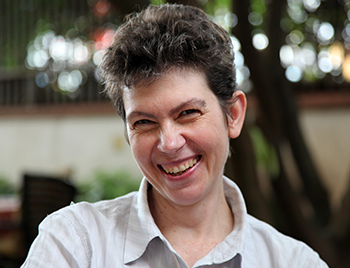Latest News Archive
Please select Category, Year, and then Month to display items
20 December 2020
|
Story Thabo Kessah
|
Photo Thabo Kessah
 Mbuyiselwa Moloi with student volunteers, Keamogetswe Mooketsi (presenter), Tshumelo Phaladi (producer), and Siphamandla Shabangu (SRC member – Social Justice and Universal Access).
Mbuyiselwa Moloi with student volunteers, Keamogetswe Mooketsi (presenter), Tshumelo Phaladi (producer), and Siphamandla Shabangu (SRC member – Social Justice and Universal Access).
The month of October 2020 marked the first anniversary of the Qwaqwa Campus online student radio, Q-Lit. “It has been a rocky road of sleepless nights, tears, and a lot of challenges. However, we have grown from strength to strength. We have made dreams of ordinary students possible. We have influenced change and inspired students to tap into their talents and potential,” said an elated station manager, Mbuyiselwa Moloi.
The station came in handy during the worst lockdown period of the COVID-19 pandemic when it bridged the communication gap between students and the university to integrate teaching and learning into the programming to ensure that no student was left behind. “With all of the regulations and online learning, Q-Lit had to be reinvented. While it was not an easy journey, we have grown more than ever before. Our August 2020 report shows that we have pulled in more than 1 600 listeners, even amid the learning, unlearning, and relearning processes. It was during this month that we also ran a series highlighting strategic offices led by women on campus as part of our Women’s Month celebration,” Mbuyiselwa revealed.
Looking to the future, the station hopes to obtain a full broadcasting licence from the regulatory body, the Independent Communication Authority of South Africa (ICASA), soon.
UN-recognised scholar awarded the prestigious TRI Annual PhD Award
2015-11-09

Dr Anneli Botha, winner of TRI Award for Best Doctoral Thesis.
Photo: Supplied
|
Two years after enrolling as a PhD candidate in the University of the Free State’s (UFS) Department of Political Studies and Governance, Dr Anneli Botha was awarded the annual Terrorism Research Initiative (TRI) Award for the 'Best Doctoral Thesis on Terrorism and Counter-Terrorism' (2014).
The TRI PhD award is a prestigious international honour, while terrorism as a scholarly venture remains a concentrated field. Dr Botha, one of the few women in this niche field, has proved to be an excellent asset. Her winning of the prestigious award was announced in its October 2015 issue of Perspectives on Terrorism (PT), a globally-circulated online journal, co-published by the European-based Terrorism Research Initiative and the America-based Center for Terrorism and Security Studies.
Based on the merit and relevance of her outstanding research, the United Nations Development Programme has appointed Dr Botha as a Consultant on Radicalisation. In addition, her PhD is to be published as a book in the United States of America early in 2016. She was appointed as a Research Associate at the University of the Free State at the beginning of this year.
An award-winning search for answers
Her thesis, titled “Radicalisation to Terrorism in Kenya and Uganda: a Political Socialisation Perspective”, tackled East African militancy, from an individualised perspective. Researchers in the past have neglected assessing details of the rebels’ childhoods. Dr Botha’s interviewed about 285 militants and their families. These individuals declared themselves openly as members of al-Shabaab and the Mombasa Republican Council (MRC) in Kenya, and the Allied Democratic Forces (ADF) and the Lord’s Resistance Army (LRA) in Uganda, at the time of the interviews.
Her doctoral dissertation provides significant information about factors that should be considered in the quest to counter and prevent terrorism. Her research shows conclusively that political socialisation begins with the family, and expands through peers, school, media, and earlier political experiences, culminating in the terrorist group.
Outstanding piece of scholarship
Dr Alex Schmid, who is the editor of PT, TRI Award Jury chairman, and one of the most respected experts of terrorism, described Dr Botha’s research as an “outstanding piece of scholarship.”
Dr Botha attributed her success to her supervisors - Professors Theo Neethling and Hussein Solomon - as well as to the people in Kenya and Uganda.